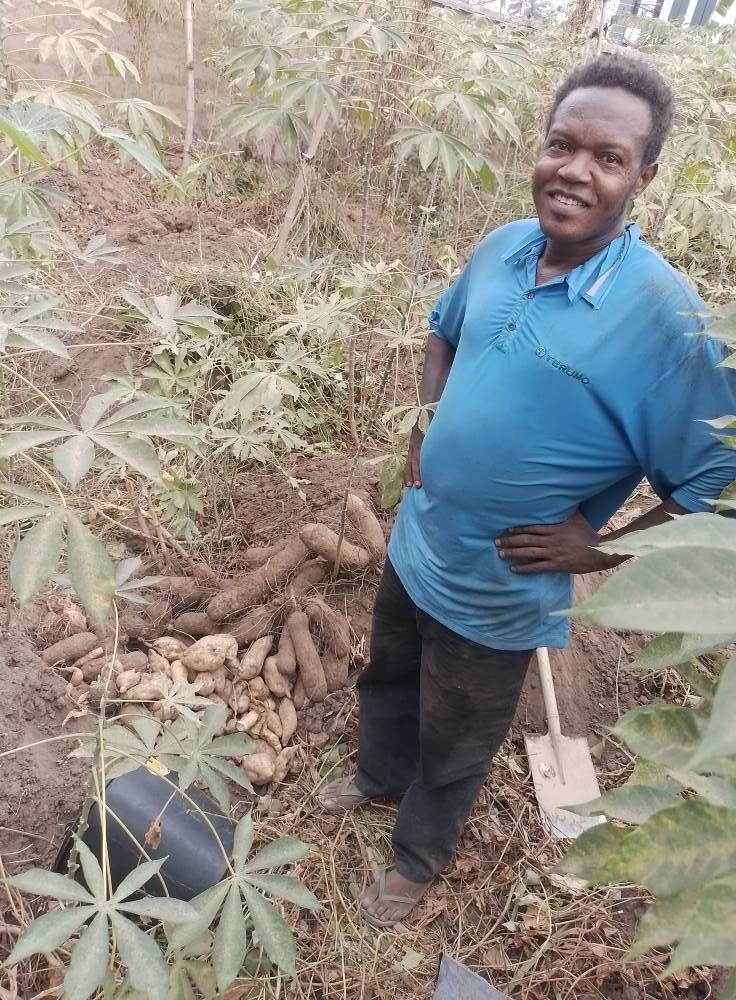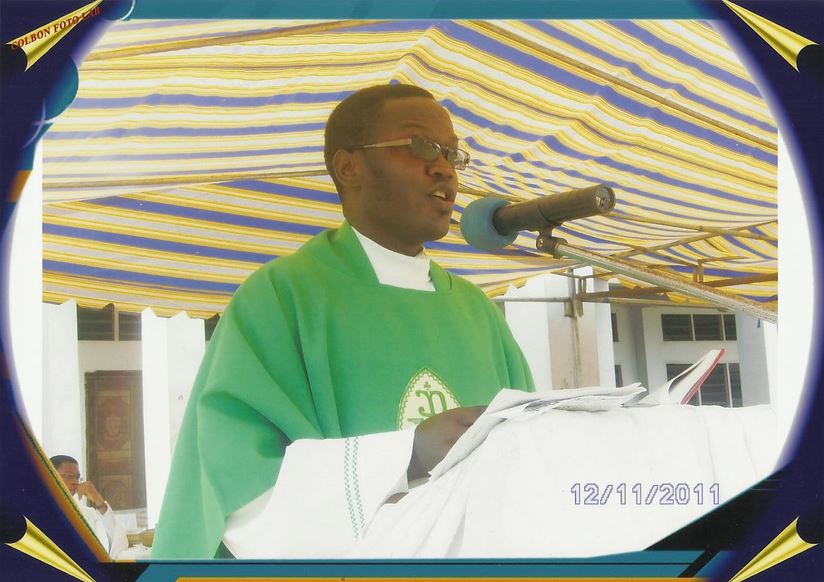
FEATURES
Catholic Priest Quits Priesthood After 17 Years - Embraces Traditional Religion, Gets Married
AFOLABIDr Echezona Obiagbaosogu, a former Catholic priest of 17 years, has announced that he has resigned from the priesthood to embrace the African traditional religion.
Obiagbaosogu, a lecturer in African Traditional Religion at the Nnamdi Azikiwe University, Awka, Anambra State, disclosed this after defending his PhD Dissertation titled “Rainmaking and Control in Igbo African Medicine,” on Wednesday, January 8, 2025.
Obiagbaosogu, who is now married, said he was fascinated by the traditional African spirituality and the art of rainmaking, adding that Africa possesses enormous resources and value which have been eroded by colonial powers.
He disclosed that he spent several months studying under a renowned native doctor, learning the intricacies of the craft, adding that he conducted research intending to recover the lost African value.
“I have come to realise that my true calling is to serve my people through the ancient traditions of our ancestors. I was a Catholic priest for 17 years before resigning to embrace the traditional African religion. The topic of my research is ‘Rainmaking and control in Igbo African medicine: A case study of Isieke in Ihiala Local Government Area, Anambra State,” he said.
"I partly lived with my maternal grandfather, who was a traditionalist, while my father was a Christian before he passed away. Though he was a Christian, he still believed in traditional materials. He was an agriculturist with trees around the compound and always brought in new ones, some of which he said were medicinal.
"So, I learned from him to appreciate nature. My background is also significant. I was once a Catholic priest—Rev. Father. I began this research as a priest five years ago and then left the priesthood, so now I am married.
"Everything about this research stems from my curiosity about nature and God. The research reflects my curiosity about spirituality and the nature of God. As a priest, I had the opportunity to work in health sectors, and I understand what health is all about.”
"I conducted this research with the intention of recovering our lost African values. There was one of my father’s friends, and when I was in the seminary, I founded a school called the Society for African Culture
"During that period, we invited my father’s friend to demonstrate that rainmaking was possible. He came and made it rain. This experience led me to investigate it in an academic way.
“My research in rainmaking and control is rooted in finding the truth and understanding how native doctors contribute to preserving African values. I discovered that it is indeed a reality and done by dibia (native doctors). I am not turning my back on God, but rather, I am embracing the divine in a more meaningful and authentic way.”
Obiagbaosogu also shared his thoughts on the relationship between magic, religion, and science, adding that, “Civilisation began with magic, moved to religion, and today we are talking about nanoscience and other fields.
"The white man was able to explore these magical laws, codify them, and call them science. So, science is essentially what was once magic.
"We can also access these magical laws, which we call African magic or religion. It is not the African magic of Nollywood. The African magic of Nollywood is one of the tools used to destroy our culture and values.
"African magic is actually African science, which remains unexplored. We must begin to modify, codify, and document it for posterity.”
When asked about his decision to leave the priesthood, Obiagbaosogu said, “Life is a process. Things happen, and people begin to look left and right.
"One important thing is for the person to know themselves. If you understand yourself and remain open to reality, you will begin to make decisions for your life.”
He declined to discuss the specifics of his resignation, saying it was a matter of personal conviction.


Alhaji Muhammad Bashir Sa’idu, former Chief of Staff to Malam Nasir El-Rufai, has implicated his former principal in a confessional statement related to an ongoing money laundering case against him.
It will be recalled that the Chief Magistrate Court in Rigasa remanded Sa’idu at the Kaduna Correctional Centre following his arrest and arraignment by security agencies on 31 December 2024.
The charges against the former Chief of Staff allege that he sold $45 million in hard currency belonging to the Kaduna State Government—equivalent to ₦18,450,000,000—at the significantly undervalued rate of ₦410 per dollar.
This was instead of the parallel market rate of ₦498 per dollar, with criminal intent, resulting in a ₦3,960,000,000 loss to the government.
According to the prosecution, the offence allegedly took place in 2022, when Sa’idu served as Commissioner of Finance in the El-Rufai administration.
The prosecution further alleged that the ₦3,960,000,000 discrepancy was laundered by Sa’idu, in violation of Section 18 of the Money Laundering (Prevention and Prohibition) Act, 2022.
A security source, speaking anonymously to select journalists in Kaduna, disclosed that Sa’idu implicated El-Rufai in his confessional statement to the police.
The accused reportedly stated, “The procedure for currency conversion was not the decision of the Commissioner of Finance but that of His Excellency, the then Governor of Kaduna State, Malam Nasir El-Rufai. Whenever the need arose to convert funds to naira, the Governor would direct how much to convert. Bids from various buyers were obtained, and in most cases, the bids I forwarded to His Excellency for approval were higher than those available in the parallel market.”
Section 18(3) of the Money Laundering (Prevention and Prohibition) Act, 2022, stipulates that anyone who violates subsection (2) is liable, upon conviction, to imprisonment for a term of not less than four years and not more than 14 years, a fine of no less than five times the value of the proceeds of the crime, or both.
...urge criminals to cease their evil acts.
The Labour Party’s presidential candidate in the 2023 elections, Peter Obi, has expressed concern over Nigeria’s escalating crime rate, particularly kidnappings.
Reacting to recent killings and abductions, including the kidnapping of two Catholic reverend sisters, Obi described the situation as “worrisome” on his X page.
Obi, the former Anambra governor, condemned the killing of the College of Nursing Sciences manager in Ihiala, stating, “no one is currently spared from the dangerous wind of many kidnappings and killings blowing through many parts of the nation”.
He noted that insecurity affects every Nigerian, impacting agriculture, health, and education, where workers are often kidnapped or killed.
Obi cited examples of kidnapped farmers, teachers, and lecturers, including the recent killing of the College of Nursing Sciences manager and the abduction of two reverend sisters.
He emphasized that these individuals contribute significantly to national development, and their kidnappings and killings are unjustifiable.
Obi urged leaders to address the situation, wondering how many cases go unreported.
He asked the federal government to deploy security measures to rescue captives and end terror, while urging criminals to stop their evil acts.
The South East region of the country witnessed a surge in violence perpetrated by separatist groups enforcing sit-at-home orders, which essentially attacked Nigeria’s sovereignty with effrontery and arrant disregard for constituted authority.
The alarming situation escalated on November 18, 2024, when unknown gunmen launched simultaneous attacks on Abatete and Ukpo communities in Anambra state, leaving a trail of destruction and death, including three vigilante members and an innocent citizen. These senseless attacks were recurring nightmares which instilled fear and uncertainty among the populace.
In the year under review, another devastating attack in Aba, Abia state resulted in the loss of 11 lives, including five military personnel and six civilians, with the Army blaming the outlawed separatist group, Indigenous People of Biafra (IPOB) movement, for the incident.
Many civilians among whom were youths were alleged to have been killed, harassed and assaulted by security personnel in a bid to end the reign of the separatist group in the region.
In fact, a report by SMB Morgen, an Africa-focused market/security intelligence gathering firm, revealed that a staggering N419.2 million ransom was paid between July 2023 and June 2024 in the South-East .
This alarming figure accounted for 40% of the total N1.048 billion paid across the six geo-political zones during the same period, with Anambra State being the hardest hit, as families shelled out N350.2 million in ransom payments, a whopping 88% of the N400 million demanded by kidnappers.
A breakdown of the ransom payments across the South-East states as revealed by the report, showed that Imo State paid N39 million as ransom, Abia State paid N25 million, while Enugu State and Ebonyi State paid significantly lower amounts, with N4 million and N1 million, respectively, as ransom in one year.
But in the regional breakdown of the N2.2 trillion ransom payments made in the same period.
According to another data from the Nigeria Bureau of Statistics (NBS) in its 2024 Crime Experience and Security Perception Survey, the South-East paid N85.4 billion, an amount lower when compared to N1.2 trillion paid in the North West, which accounted for the highest share.
A Federal High Court sitting in Abuja has summoned the Minister of Interior, Olubunmi Tunji-Ojo, and the Attorney-General of the Federation, AGF, Lateef Fagbemi, over issues of the Expatriates Employment Levy, EEL.
According to the court summons, both are to appear before the court on January 16 to explain why implementing the proposed expatriate taxation regime should not be stopped.
The presiding judge, Justice Inyang Ekwo, gave this ruling on Thursday after a motion ex parte moved by Patrick Peter, counsel who appeared for the plaintiff.
Ekwo directed that the minister and the AGF be served with the motion within three days of the order.
The suit, marked FHC/ABJ/CD/1780/2024, was filed by the Incorporated Trustees of New Kosol Welfare Initiative.
The group sought an order of interim injunction barring the defendants from commencing the implementation of the new expatriates’ taxation regime in Nigeria until the motion is heard and decided.
In the affidavit attached to the suit, the Programme Implementation Coordinator of the group, Raphael Ezeh, said the EEL taxation policy was announced by the federal government on Tuesday, February 27, 2024.
“According to KPMG and other online information analysts and dissemination agencies, the federal government intends to compel all companies and organizations who engage the services of expatriates to pay EEL as follows: For every expatriate on the level of a director, fifteen thousand United States dollars ($15,000) equivalent to twenty-three million naira, by the current exchange rates, per annum.
“For every expatriate on a non-director level, ten thousand United States dollars ($10,000) equivalent to sixteen million naira, by the current exchange rates (N16,000,000) per annum,” he said.
According to Ezeh, the federal government has also proposed additional regulations, including penalties and sanctions for non-compliance with the proposed taxation regime.
Ezeh stated that inaccurate or incomplete reporting would result in five years of imprisonment and/or a fine of N1 million.
He noted that the failure of a corporate entity to file the EEL within 30 days will attract a penalty of N3 million.
The Programme Implementation Coordinator added that failure to register an employee within 30 days or the submission of false information will also attract a penalty of N3 million.
The failure of an organization to renew the EEL before its expiry date will incur a sanction of N3 million.
“The proposed taxation regime is totally an anti-people policy because of its radical effect on different aspects of the Nigerian economy, and it works like a choke-hold against the economic growth of the nation,” he said.
He noted that taxation is a sensitive issue that requires collaboration between the executive and legislative arms of government under the 1999 Constitution (as amended).
He pointed out that, under Section 59 of the Constitution, the executive arm alone lacks the authority to impose taxes on corporate bodies and citizens.
The matter was adjourned to January 16 for the defendants to appear before the court and show cause.
The Federal Ministry of Interior suspended the implementation of the EEL in 2024 to allow for further consultations with the Nigerian Association of Chambers of Commerce, Industry, Mines, and Agriculture, NACCIMA, and other stakeholders.
[DailyPost]
Former Inspector General of Police Mike Okiro has withdrawn from the race to occupy the position of President General of Ohanaeze Ndigbo.
Okiro made the announcement at a briefing in Enugu on Thursday night.
He cited the order of an Enugu State High Court barring him from contesting in the election for his withdrawal.
The election is scheduled to January 10, 2015.
According to him: “I have been made aware of the Enugu State High Court’s interim order, which regrettably restrains me from contesting the Ohanaeze Ndigbo Worldwide Presidency General Election tomorrow.
“The court order, based on alleged non-indigene status, contradicts verifiable facts. It is unfortunate that the court did not invite me or heard from me before giving that obnoxious order which I got from the media. The facts are (a) That I hail from Egbema in Rivers State as shown by my National Population Commission Attestation of Birth. (b) My Traditional Ruler, the Nzeobi of Egbema, has also confirmed my indigene status of Rivers State. (c) I have written many books where my indigeneship of Rivers State is shown in the author’s column. A good example is my best seller, titled: “Nigeria: The Restructuring ‘Controversy”. (d) Page 6 of my biography written by Mr. Dozie Okebalama also shows my indigeneship of Rivers. (e) I have attended many Imeobi meetings where I represented Rivers State in the attendance list compiled by the Secretary-General. (f) As a student in the University of Ibadan, I was a member of the Rivers State Students’ Association, where I was elected as Treasurer, and another Great UIte, now Bistinguished Senator Andrew Uchendu was elected as Secretary. (g) I was representing Rivers State during the meetings of the South-South People’s Assembly under our respected leader, Chief Edwin Clark, where Prof. Pat. Utomi, another Great Nigerian, represented Delta State. My records and credentials speak for themselves.
“As an Igbo man and elder statesman of Rivers State Extraction which said position has been zoned to by the electoral committee, I believe in the rule of law and shall respect the court’s order.
“My Obedience to court orders, no matter how unfavorable, demonstrates our commitment to democracy. I believe in the principles of rule of law as the rule of law ensures our collective progress.
“The rule of law safeguards our society; its principles must be upheld, our democratic values are non-negotiable, together we will emerge stronger. Our stance for justice, due process and rule of law shall vindicate us.
“I will not participate in any election pending the final determination of the matter pending before Hon Justice N.R Oji of Enugu State High Court which court gave the restraining order.
“Although I’ve not been formally served with the suit/processes or order, my commitment to law and order remains unwavering, despite the fact that the reliefs granted in the order against me appears to undermine my fundamental right guaranteed in Chapter IV of the 1999 Constitution (as amended).
“My distinguished career as Nigeria’s Inspector General of Police underscores my dedication to justice and what is noble.
“I have instructed the Chambers of Eze Okafor & Co, my lawyers to pursue the case to its logical conclusion to ensure that the purveyors of hate and lawlessness are brought to book in line with our enabling laws.
“As provided by our constitution, I demand to be heard, and I am sure that the court will ensure that the twin pillars of natural justice will be observed to the later in handling the case. We have not lost hope in our judicial system.
“I urge my immediate community Egbema, the entire Igbo speaking people of Rivers state who are solidly behind me and all my supporters across Imo, Abia, Ebonyi, Enugu, Anambra, and Delta to stand by the rule of law throughout the period of this contest.
“Our resolve strengthens Ohanaeze Ndigbo’s unity and progress. Together, we’ll navigate this challenge.
“My Governor, His Excellency, Siminialayi Fubara GSSRS unwavering support is most highly appreciated and same cannot be taken for granted. Your Excellency’s leadership indeed inspires me.
“Ohanaeze Ndigbo embodies Igbo unity, progress, and peaceful coexistence. Our organization promotes harmony among Igbos worldwide. Let’s prioritize peace and unity.
“I reaffirm my commitment to Ohanaeze Ndigbo Ideals; unity, progress and peace in Igbo land.
“Justice shall prevail; Igbo unity and progress remain our guiding principles.
“I assure all of you that we shall overcome this minor setback as our democratic values are non-negotiable.”
[TheNation]
The Chief Executive Officer of Financial Derivatives, Bismarck Rewane, has expressed support for the proposed telecom tariff hike, citing its potential to enhance productivity and moderate inflation in the economy.
Speaking on Channels Television’s Business Morning on Thursday, Rewane highlighted the economic benefits of the tariff adjustment, which has been proposed by telecom operators and is currently under review by the Nigerian Communications Commission.
“Yes, it helps to reduce inflation because it increases productivity,” Rewane said, explaining the broader implications of the proposed adjustment.
Telecom operators have submitted a proposal to the NCC seeking a 100 per cent increase in tariffs to address rising operational costs, including inflation and higher service delivery expenses.
Nigeria’s Minister of Communications, Innovation, and Digital Economy, Bosun Tijani, had earlier confirmed the government’s intent to adjust tariffs, with the NCC set to finalize the modalities.
Rewane noted that the proposed tariff hike reflects investor confidence in the sector. “Yesterday, the price of MTN shares went up by 10 per cent to N220. Investors have already factored that in and are expecting a lot of good goodies,” he said.
He emphasized that the increase, combined with additional investments, would contribute to making the telecom industry sustainable, indirectly boosting productivity and output.
“Any increase in productivity and output is likely to allow inflation to moderate, which is the goal,” Rewane added.
He acknowledged the alignment between policymakers, regulators, and operators on the need for sustainability in the telecom sector.
“We heard from the policymaker, Bosun Tijani, who was very clear that we want a sustainable sector. But we also heard from the regulator saying that we will hold these guys to quality of service.”
Rewane, however, dismissed the likelihood of a 100 per cent hike, predicting a more moderate adjustment of between 40 per cent and 50 per cent per cent.
“Will they get 100%? No, they will definitely not. We suspect that we are likely to see something between 40 per cent and 50 per cent, which is fair after so many years of static changes,” he said.
Meanwhile, the Nigerian Communications Commission has scheduled a meeting with telecom consumer groups to debate the proposed tariff hike.
The discussions aim to ensure consumer concerns are addressed while balancing the operators’ needs for sustainability.
A final decision on the tariff adjustment will be communicated after the consultations are concluded.
The NCC’s decision on the proposed tariff hike is expected to balance industry sustainability with the need to protect consumers from excessive cost burdens.
[Punch]
The interception of 59 minors from Kano en route to Nasarawa State has taken a new dimension as the senator representing Kano South Senatorial District, Sumaila Kawu, has stopped the trafficking probe.
Kawu asked the police to hand over the 59 minors intercepted in a J5 vehicle in Abuja on its way to Nasarawa State, promising to reunite them with their parents.
The lawmaker showed up at the FCT police command yesterday to say that the movement was an almajiri form whereby students migrate to other parts of the country to study.
Earlier on Tuesday, the FCT commissioner of police, CP Olatunji Disu,had paraded the vehicle driver, Idris Usman, and the children, promising to ensure they were returned to their base in Kano to reunite with their families.
Disu had said, “This incident has been classified as a case of suspected child abuse and trafficking given the circumstances and the absence of proper documentation or parental consent for the movement of the minors.
“The suspects’ vehicle and all the children are with us while a thorough investigation is underway.”
After the briefing, Senator Kawu, who kicked against the mode of transportation of the children, told the police to hand over the children to him.
Kawu observed that there was nothing wrong with transporting the children to Nasarawa for training, a position that introduced a surprising dimension to the case at the police command.
When asked about the condition of the children’s transportation, Kawu said, “We will resolve it. We have secured another bus that will carry them back home. I am advising our people to stick to the teachings of the Holy Prophet Muhammed (SAW) and the Qur’an in searching for knowledge. We have a procedure, a process provided by Islam. We must stick to that process. We must avoid traditional ways of doing things.”
Operatives of the Nigeria Police Force had intercepted a white Peugeot 15 bus with Reg. No. KMC 283 ZJ along the Abuja-Kano route with 59 children suspected to have been trafficked from Kano. They were packed into 15-seater bus.
On Wednesday, the police operatives, led by deputy superintendent of police Sarki Umar, intercepted them on January 6, 2025, at about 3:30 p.m., along the Abuja-Kano route, heading to Nasarawa State.
The police said the kids, aged between four and 12, came from different families and were being transported by one Idris Usman to a male resident of Nasarawa State.
The commissioner of police, FCT, CP Olatunji Disu, said some arrests had been made, and the police would ensure that the children were returned and reunited with their families.
He also said the driver, Usman, who claims to be a teacher with over 40 years of experience, travelled to Kano State to convey the children en route to Nasarawa State under the pretext of training them.
The vehicle driver operates with his motor boy, Al Hassan Ibrahim, who is also from Kano State.
The FCT police commissioner said, “This incident has been classified as a case of suspected child abuse and trafficking, given the circumstances and the absence of proper documentation or parental consent for the movement of the minors.
“The suspects, the vehicle, and all the children are in custody while a thorough investigation is underway. The Police Command is working closely with the FCT Social Development Secretariat (SDS) to ensure that the children are safely reunited with their families and to bring all those involved in this act to justice.
“I want to reiterate our commitment to protecting vulnerable groups, particularly children, from exploitation and abuse in line with the Child’s Rights Act 2003. We appeal to parents and guardians to remain vigilant and ensure the safety of their children,” the commissioner had said.
Yesterday’s intervention by the senator seems to have changed the mind of the police towards further investigation and prosecution of the suspects.
The Nigeria Polics Force (NPF) has arrested a woman, Ihsanatu Shaaibu, and one other unnamed suspect, over alleged child abuse by inflicting grievous injuries on a five-year-old stepdaughter, Fa’iza Bala.
The development followed a viral video of the incident on social media. Consequently, Police operatives effected the arrests on Thursday.
This was disclosed by the Force Public Relations Officer (FPRO), ACP Muyiwa Adejobi, in a post on his verified social media handles and that of the NPF on Thursday night.

The Police image-maker wrote: “In relation to the viral video where a woman identified as Ihsanatu Shaaibu physically abused and caused grievous injuries to her stepdaughter Fa’iza Bala, a 5 year old.
“The Suspects have been arrested today, Thursday 9th Jan 2025, and will be prosecuted as soon as investigations are concluded. We will keep you abreast of the proceedings.”
More...
President Bola Tinubu has decorated Nurudeen Yusuf, his aide-de-camp (ADC), with his new rank of colonel.
The president decorated Yusuf on Thursday at the State House, Abuja.
Yusuf was appointed Tinubu’s ADC in April 2023 before his inauguration on May 29.
In a statement, Bayo Onanuga, the president’s special adviser on information and strategy, said the president described his ADC as a “reliable officer, deserving of elevation in rank”.
The presidential spokesperson quoted Tinubu as saying that he envisions the ADC achieving greatness in his military career.
Onanuga said Yusuf, formerly a lieutenant colonel, was promoted to the rank of colonel by Nigerian Army promulgation AHQ MS/G1/300/252/2 on December 19, 2024, noting that the rank’s seniority became effective on September 22, 2023.
“You all know Nurudeen Alowonle Yusuf. He carries a lot of responsibilities. I am joyous that the military authorities have promoted my ADC,” the statement reads.
“He is worthy of the promotion, and I am very happy for him. Nurudeen is a diligent and reliable officer with the right temperament. I believe he will go farther and farther in his profession.
“We are with you. We love and really care about you. We will continue to do so. Character defines man, and it has defined you. With your promotion, you are highly respected. From the bottom of my heart, I congratulate you. We thank God for you.
“May God bless our armed forces and keep them safe.”
The presidential spokesperson added that Tinubu commended the ADC’s wife for “keeping the home front steady, calm, and reliable” during his service.
Yusuf expressed gratitude to the president for trusting him as his ADC and reaffirmed his loyalty.
“I stand here today filled with immense gratitude and humility as I reflect on this remarkable occasion of my decoration with the rank of Colonel in the Nigerian Army,” he said.
“This moment is a personal milestone and a testament to the enduring values of the unwavering support of those around me.
“First and foremost, I thank the Almighty Allah for His grace, guidance, and blessings upon my career and life. Without Him, this day would not have been possible.
“To His Excellency, the President and Commander-in-Chief, I am deeply honoured by the privilege to be granted promotion to this enviable rank.
“I wish to use this unique opportunity to restate that your leadership and trust have been a source of inspiration, and serving as your Aide-de-Camp has been a profound privilege and the highest honour of my career.
“Thank you for your confidence in me and for being here to share in this special moment.”
In attendance were AbdulRazaq AbdulRahmon, governor of Kwara; Nuhu Ribadu, national security adviser (NSA); Kayode Egbetokun, inspector general of police (IGP); Christopher Musa, chief of defense staff (CDS); and Bello Matawalle, minister for state defense.
Others include Kudirat Yusuf, the ADC’s mother; Ganiyat Yusuf, his wife; and Abiodun Yusuf, his daughter.







[TheCable]
The Minister of State for Labour and Employment, Nkeiruka Onyejeocha, says the new minimum wage will be reviewed in less than two years from now.
Onyejeocha said this on Thursday in Umuahia while addressing newsmen after a meeting with labour leaders in Abia.
She said that President Bola Tinubu was committed to his promise to Nigerian workers by ensuring the minimum wage was reviewed after three years.
She said that the president was deeply concerned about the welfare of workers and would keep to every promise he made to them.
“We are not going to allow minimum wage review to be forever.
“It used to be about five years, but now, in three years, which is less than two years, we will also review the minimum wage,” Onyejeocha said.
According to her, it has been said and it has been documented.
The News Agency of Nigeria (NAN) reports that Tinubu had approved a N70,000 minimum wage in July 2024, with a promise to review it every three years.
Onyejeocha, who hails from Abia, said that she decided to meet with the labour leaders, who she described as her constituents, “to wish them well,” after spending her Christmas and New Year holidays in the state.
She said that she reminded the leaders that labour is an integral part of the government that should help to ensure stability and peace, not just in the workplace, but also in the country.
“I reminded them that we should have a strike-free year, where we will be able to work with the government in partnership, knowing that if we are in peace, we will be more productive,” she said.
The Abia Chairman of Nigeria Labour Congress, Mr Ogbomna Okoro, commended the minister for her giant stride in office, saying that the body was proud of her and would collaborate with her.
Earlier, the minister, who is from a royal family, had a roundtable with the Abia State Council of Traditional Rulers, where she took time to explain some Federal Government’s policies to them.
(NAN)
VIDEO: Building mansion in village as Igbo man is waste of money – Canada-based Medical Doctor, Dr. Zo
AFOLABICanadian-based Nigerian doctor, Arinze Onwumelu, also known as Dr. Zo, has shared his opinion about the financial prudence of building mansions in villages.
Speaking on the topic, Dr. Zo questioned the longstanding tradition, which he described as economically unviable in the face of modern realities.
“I am Igbo, from the eastern part of the country,” he began, pointing out a cultural norm among the Igbos.
“There is this thing we have in the east that for you to be recognised as an Odogwu (a wealthy man), you must build a big mansion in the village. I did it too. I watched a lot of people this last Christmas go home and open their big mighty mansions in the East, especially. I don’t think other parts of the country have this same concept.”
Dr. Zo expressed concern about the lack of economic value in such investments.
“Sometimes, I wonder, we the Igbos think we are very smart in terms of economy, but sometimes I wonder the economic value. If I build that house somewhere in Lagos, Abuja, or Port-Harcourt, even Enugu, I would have made over a N100 million in the last five years.”
While Dr. Zo did not entirely dismiss the idea of owning property in the village, he advocated for moderation.
“I am not saying you should not build a house in the village. What I tell you is what I tell my younger ones: go to the village and just build a small house, 4-bedroom, have a big compound. It’s always good to have something in the village, but it does not have to be a mansion, occupying everywhere with houses. It’s rubbish.”
Reflecting on his personal experience, Dr. Zo shared the burdens of maintaining such properties.
“What I am saying to you, I did it, my father did it, father’s friends did it, and their kids are struggling today to maintain those houses. I am spending a lot of money to maintain the house I haven’t been in over four years because of things going on in the east—insecurity and stuff. So, what is the economic value? It is just a wrong move.”
He went further to advise against repeating the mistakes of the past. “What I am saying today, you will realise it in 25 years. Absolutely no need for those houses. Use that money and put it in better locations that will give you money. This is coming from a mistake that I made. A village mansion is a waste of time and a waste of money.”
Media
Nigerians are facing significant visa rejections for intending travellers to Schengen nations amidst the growing rate of migration to developed countries. Half of all visa applications to the destination by Nigerians were rejected.
The latest Henley Global Mobility Report January 2025, published by Henley & Partners, indicates that out of 105,926 Schengen visa applications submitted by Nigerians in 2024, 42,940, representing 40.8 per cent of the total application were rejected.
Migration has been part of the Nigerian middle-class psyche for decades, but the migration rate has increased in the last four years as economic hardship continues to bite harder.
Inflation soared to an all-time high of 34.60 per cent in November 2024, fueling the cost-of-living crisis, unemployment, and lack of opportunities, thereby forcing thousands to seek better opportunities outside the country’s shores.
The rejection level thus placed Nigeria among the top 20 countries withthe most denied visas to the choice destination and ranked 11th on the list.
According to the report, the rejection, largely driven by passport power and identity-based visa policies, has more than doubled over the past decade and created substantial barriers to economic mobility for Nigerians and other African citizens.
Nigeria’s passport ranked 94th in the latest global most powerful passports.
Similarly, Africa also faced a higher rejection rate compared to other continents despite the insignificant volume of applications from the region.
The report showed that six of the top 10 countries facing the highest Schengen visa rejection rates are in Africa.
Comoros leads with a 61.3 per cent rejection rate, followed by Guinea-Bissau at 51 per cent, Ghana at 47.5 per cent, Mali at 46.1 per cent, Sudan at 42.3 per cent, and Senegal at 41.2per cent.
Three Asian countries and a European country complete the list: Pakistan with 49.6 per cent, Syria with 46 percent, and Bangladesh with 43.3 cent. Greece, despite being a European Union member and part of Europe’s Schengen area, holds the second-highest rejection rate at 56.4 per cent. Furthermore, the top 10 African countries, while submitting only 2.8 per cent of global Schengen visa applications, faced a rejection rate of 44.8 per cent. Half of the 277,792 applicants from the top 10 countries with the highest rejections were denied visas.
The report said: “Looking at broader regional patterns in 2023, the top 20 countries in Africa and Asia submitted 703,894 applications, representing 6.8 per cent of all Schengen visa applications, of which 40 per cent were rejected.
“The top 10 African countries faced particularly high rejection rates, with applicants experiencing a 45 per cent rejection rate, higher than combined Africa–Asia average of 40 per cent.”
Prof. Mehari Maru of the School of Transnational Governance and the Migration Policy Centre at the European University Institute and of Johns Hopkins University School of Advanced International Studies, commenting on the report, said: ‘The global mobility divide is widening significantly. As the Henley Passport Index January 2025 edition reveals, global travel freedom has nearly doubled from 58 visa-free destinations in 2006 to 111 in 2025, but the gap between the most and least mobile nations has reached unprecedented levels.
“Africans face consistently higher rejection rates than their Asian and global peers. In 2023, despite submitting half as many applications as those from Asia, African applicants were twice as likely to be rejected, with rates 14 percentage points higher than Asian applicants.”
















